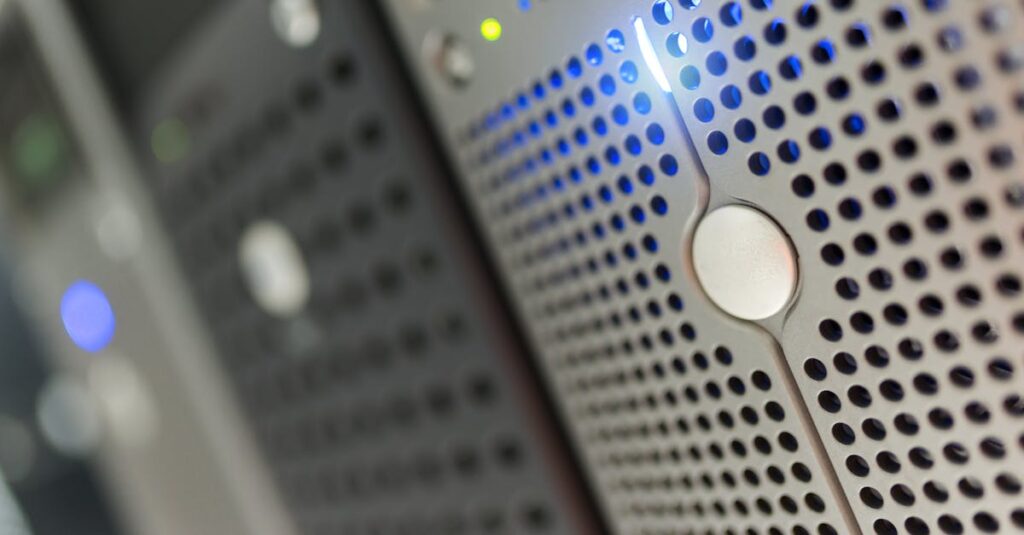In the world of technology, cloud computing hardware is the unsung hero, quietly powering the digital universe while most of us are busy scrolling through cat memes. Picture this: instead of your laptop struggling to handle that massive spreadsheet, it effortlessly accesses a super-powered server floating in the cloud. Sounds like magic, right? Well, it’s all thanks to the incredible hardware that makes cloud computing possible.
As businesses shift to the cloud, understanding the hardware behind this phenomenon becomes essential. From servers that could double as space heaters to storage solutions that hold more data than your local library, cloud computing hardware is the backbone of modern IT. So buckle up and get ready to explore how these tech marvels are transforming the way we work, play, and binge-watch our favorite shows.
Table of Contents
ToggleOverview of Cloud Computing Hardware
Cloud computing hardware comprises various components that support the functionality and scalability of cloud services. Servers are critical, providing the backbone for data storage, processing, and management. These servers often operate in large data centers, where multiple units work together to handle vast amounts of information.
Storage devices play a key role in cloud environments. They save data in a reliable manner, allowing users to access information swiftly. High-performance storage solutions, such as solid-state drives (SSDs), enhance speed and efficiency, reducing latency for end users.
Networking equipment connects these servers and storage devices to the internet. Routers and switches facilitate communication between users and cloud resources. Robust networking capabilities ensure seamless access to applications and data from anywhere.
Virtualization technology further optimizes hardware usage. By enabling multiple operating systems to run on a single physical server, it increases resource efficiency. This technology reduces costs and improves scalability for businesses.
Cooling systems are essential in data centers. They maintain optimal operating temperatures for hardware, preventing overheating and ensuring longevity. Adequate power management systems support energy efficiency and reliability for hardware operations.
Understanding cloud computing hardware is vital for businesses and individual users alike. Recognizing the significance of these components can lead to better decisions regarding cloud service adoption and optimization. As cloud technologies continue to evolve, awareness of hardware advancements will contribute to enhanced performance and user experience.
Types of Cloud Computing Hardware
Understanding the types of cloud computing hardware enhances comprehension of cloud services’ efficiency and scalability. Various components, including servers, storage devices, and networking equipment, are crucial in this ecosystem.
Servers
Servers form the backbone of cloud computing. They handle data storage, processing, and management in data centers. With robust specifications, these servers support virtual machines, allowing effective resource allocation. Additionally, modern servers utilize multi-core processors for improved performance. High availability configurations reduce downtime, ensuring consistent access to applications. Enterprises benefit from dedicated servers, while smaller users may prefer shared or virtual options. Cloud service providers often employ racks or blade servers to maximize space and efficiency.
Storage Devices
Storage devices play a vital role in cloud infrastructure. Solid-state drives (SSDs) provide fast data access, enhancing overall user experience. High-capacity hard disk drives (HDDs) remain popular for cost-effective bulk storage. Hybrid solutions combine SSDs and HDDs, balancing speed with storage capacity. Cloud service providers implement tiered storage strategies to optimize cost and performance. Redundancy and data replication across locations ensure data durability. Organizations leverage these storage systems to meet varying data demands.
Networking Equipment
Networking equipment connects all components within cloud environments. Routers direct traffic between servers and users, facilitating communication. Switches manage data flow within local networks, enhancing transfer speeds. Firewalls safeguard cloud resources, protecting against unauthorized access. Load balancers distribute incoming traffic, optimizing resource utilization. High-speed fiber optic connections improve bandwidth, ensuring seamless service delivery. Consequently, proper networking is essential for maintaining a reliable cloud infrastructure.
Key Features and Specifications
Cloud computing hardware features specific components that enhance efficiency and performance. Understanding these specifications becomes vital for users to optimize their cloud experience.
Performance Metrics
Performance metrics focus on key factors such as processing speed, latency, and throughput. High-performance servers utilize powerful CPUs, often multi-core processors, enabling them to handle numerous tasks simultaneously. SSDs deliver faster data access, greatly reducing latency compared to traditional HDDs. Network throughput increases with advanced routers and switches, facilitating faster data transfers between users and services. Monitoring these metrics helps businesses ensure optimal functioning and user satisfaction.
Scalability Options
Scalability options allow cloud computing systems to adapt to varying workloads. Horizontal scaling adds more servers to handle increased traffic, ensuring resource availability during peak periods. Vertical scaling upgrades existing servers with better processors or additional memory. Data storage solutions also scale seamlessly, with cloud storage platforms offering flexible capacity adjustments. Implementing these options enables businesses to grow without encountering performance bottlenecks.
Leading Cloud Computing Hardware Providers
Amazon Web Services (AWS) stands out as a premier cloud computing hardware provider. It excels in offering robust computing, storage, and networking solutions, driving cloud adoption across various industries. Microsoft Azure follows closely, delivering integrated hardware and software solutions that enhance business agility and performance.
Google Cloud Platform (GCP) offers cutting-edge hardware tailored for big data processing and machine learning applications. Its innovative infrastructure supports high-performance computing needs. IBM Cloud specializes in enterprise-grade solutions, emphasizing security and reliability as core facets of its hardware offerings.
Hewlett Packard Enterprise (HPE) provides a range of servers and storage systems designed to optimize cloud environments. Its solutions support hybrid cloud architectures, promoting flexibility and scalability. Dell Technologies also plays a significant role, with hardware solutions that facilitate the deployment and management of cloud infrastructure.
Lenovo enhances cloud services with its high-performance servers and storage solutions. Its focus on innovation allows businesses to leverage efficient and scalable cloud resources. Cisco Systems stands out in networking hardware, contributing essential components like routers and switches that ensure seamless connectivity in cloud environments.
Infinidat delivers advanced data storage solutions that maximize cloud data accessibility and speed. Flexibility and performance define its offerings as companies increasingly rely on data-driven strategies. Equinix provides colocation services and interconnectivity solutions, making it a vital player in the cloud hardware ecosystem.
These providers forge a path toward more efficient cloud computing hardware, enabling businesses to scale and innovate effectively. Understanding these key players enhances awareness of the options available for optimizing cloud infrastructure.
Conclusion
Cloud computing hardware is the backbone of modern digital infrastructure. As businesses embrace cloud solutions, awareness of the underlying components becomes essential. The performance and scalability of cloud services hinge on powerful servers, high-speed storage devices, and reliable networking equipment.
Investing in the right hardware ensures optimal efficiency and resource management. By understanding the specifications and features of cloud computing hardware, organizations can make informed decisions that enhance their cloud experience. As technology continues to advance, staying updated on hardware developments will be crucial for leveraging cloud capabilities effectively.





